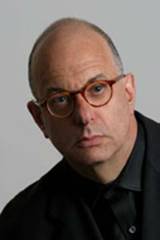Jerusalem Symphony at Strathmore
 The Jerusalem Symphony Orchestra played a concert of 20th-century music at Strathmore on Monday night. I heard of their conductor, Leon Botstein, first as a musicologist, champion of American music (among other things, the successor of the legendary Oscar Sonneck as editor of The Musical Quarterly), and as one of the directors of the Bard Music Festival. In everything I have seen him do, I admired the combination of intelligence and wit, and the programming for this event was an important part of its appeal, in addition to the now-reviving reputation of this orchestral ensemble. As reported in the Jerusalem Post, the orchestra's arrival for their U.S. tour coincided -- almost disastrously -- with the record snowfall in New York City, but they eventually made it out of Manhattan and gave one concert in Florida, with a completely different program, before coming to Maryland.
The Jerusalem Symphony Orchestra played a concert of 20th-century music at Strathmore on Monday night. I heard of their conductor, Leon Botstein, first as a musicologist, champion of American music (among other things, the successor of the legendary Oscar Sonneck as editor of The Musical Quarterly), and as one of the directors of the Bard Music Festival. In everything I have seen him do, I admired the combination of intelligence and wit, and the programming for this event was an important part of its appeal, in addition to the now-reviving reputation of this orchestral ensemble. As reported in the Jerusalem Post, the orchestra's arrival for their U.S. tour coincided -- almost disastrously -- with the record snowfall in New York City, but they eventually made it out of Manhattan and gave one concert in Florida, with a completely different program, before coming to Maryland.
The evening began with a respectful performance of the national anthems of the United States and Israel. The anthem of the latter -- Hatikvah (התקוה, The Hope), a minor mode tune in a Hollywood arrangement -- seemed to inspire more of the spectators to sing along. When Bohuslav Martinů composed Památník Lidicím (Memorial to Lidice) in the 1940s, he was living in the United States, a forced exile from his self-imposed Paris exile from his native Czechoslovakia. It commemorates the 1943 massacre in the town of Lidice, a brutal retaliation by the Nazis for the assassination, by bomb attack, of a Gestapo security chief in Czechoslovakia. The Germans immediately killed or deported to camps all of the adults and sent many of the children to be raised by German families as Germans. The town itself was razed to the ground, and no trace remains of the place to this day.
The piece opens with a vast boom of sound that is followed by lush chords, made fragile because they are buzzing with dissonance. The brass and woodwinds played well when they were exposed in this piece, especially the ethereal, distanced effects of the trumpets with mutes. If the Czech folk idiom summoned by Martinů here reminded me of the Israel national anthem, I should not be surprised. The tune's composer, Samuel Cohen, was Moldavian and based it on a theme in the Moldau section of Bedrich Smetana’s Má Vlast, which was in turn derived from a much older folk song. Threatening the peaceful mood are menacing dissonant sounds, often reminiscent of American film music. The piece could easily go quite well with Raiders of the Lost Ark, for example. It's a beautiful work, over before you know it, and the JSO gave a stirring rendition.
The first half concluded with an American symphonic work composed around the same time, Aaron Copland's music for the Martha Graham ballet Appalachian Spring (premiered in its original chamber orchestra version at the Library of Congress in 1944). Martinů's piece had the same combination of patriotic hope and nostalgia for a homeland dangerously threatened, but here the story is about the birth of a marriage in the American heartland. Oddly, since the music appears to incarnate that sense of a bucolic America, Copland did not even know what the ballet's scenario was when he began to compose it.
This struck my ears as a somewhat pedestrian reading, as if the piece were just too familiar to inspire, which it may be, having come to represent "The American Sound" as it does for many people. There was some strong solo work in the Copland, notably from the JSO's concertmaster, Jenny Hünigen, a rather tall, lithe, and strikingly beautiful woman besides being a fine player. The orchestra did not seem fully to own the sometimes crazy shifting meters of the work, which undermined the overall effect. The trumpets, who were otherwise quite good, seemed a little ragged on attacks and endings in the soft passages.
Mark J. Estren, The Jerusalem Symphony's WWII Refrain (Washington Post, March 1) Steve Smith (on the New York performance), Testimony (Night after Night, March 13) |
That being said, the extramusical issues are less interesting than the heft and tone of this great symphony, alternatingly suave and sarcastic, raucous and tender. Botstein brought forth sculpted masses of sound, big swells at the end of the first movement, a powerful sense of rhythmic propulsion in the second movement that spins and accelerates out of control, and an overwhelming racket of brass and percussion in the fourth movement. Some of the more delicate moments were less pleasing, particularly in the third movement, which did not come together rhythmically as it should in aligning the two against three patterns. Little matter to the audience, who applauded each movement and gave enough of an ovation at the end to earn two encores. Both Meyerbeer's Coronation March (from Le Prophète) and Shostakovich's Tahiti Foxtrot, a wry setting of "Tea for Two," brought a much needed moment of lightness.





















































No comments:
Post a Comment